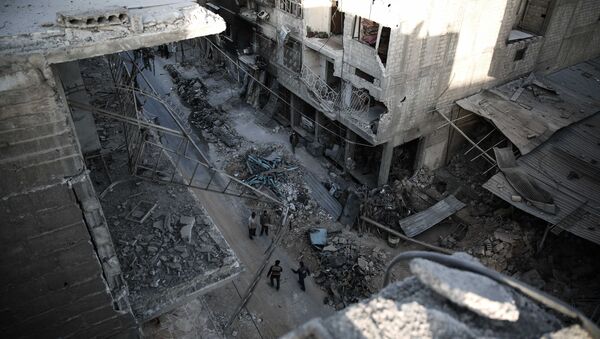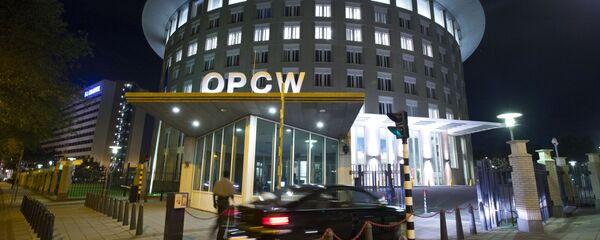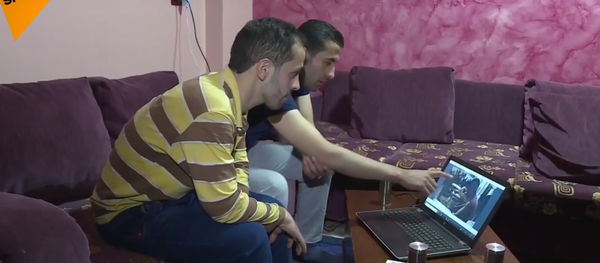Immense hatred in militant jail
The detainees were living in inhumane conditions in al-Tawba, feeling the constant fear of torture and violence. Moreover, they had to do backbreaking work digging trenches and tunnels.
"It is only at al-Tawba prison where I have seen such immense hatred. This is unbelievable that one person has decided that the other is a non-believer because he does not know something about Islam. We were accused of being heretics because we are military personnel and we have been protecting our motherland," Ali Barhum told Sputnik.
Barhum was kidnapped by the militants in the city of Adra Iabor in Eastern Ghouta five years ago and taken to the town of Douma.
"The men had to dig underground tunnels; women had to cook, do the cleaning, and repair clothes. One had to meet his quota in order to receive food. Food was a very important and painful issue. Even chubby people turned into living skeletons as hunger was constant. We were mainly given bread and porridge. We were given hot food at rare occasions. They fed us mostly once a day, or once in two days sometimes," Barhum said.
There were three shower stalls in the prison, but they had no doors, so anyone passing by could see a person taking a shower, Barhum continued.
All the former detainees confirm that the soldiers and officers of the Syrian military had undergone severe torture in the militants' jails.
Col. Muin Biub of the Syrian army was in detention in several other jails, for example, Siramik and al Kahf, which are the prisons for the Syrian military personnel. Once, militants put him in a metal cage and drove him along Douma's streets. Buib was also forced to dig underground tunnels for months.
"There is no hatred in my heart despite all that I have gone through… Only God can judge them, only he knows how to punish them. I want to live normal life without war. I hope that other militants will draw conclusions and will lay down their arms. They realized that they were cold-heartedly used for committing crimes," Buib told Sputnik.
Finding new family in jail
A woman named Hanna has already undergone all the required procedures to confirm her identity. She is holding tightly a hand of her 17-year-old daughter. Both spent five years in jail after being kidnapped in the city of Adra Iabor.
In Damascus, Hanaa saw her elder son, who arrived in the Syrian capital with his grandmother. There were tears, and embracing, and laughing when they met.
"I am so happy to see you, my son. Love for you helped me to overcome all this. You have grown up so much, you have become a man," Hanaa told her son.
The woman said that she had been held by militants in a basement room with six other women.
"We have not seen the Sun. But we have become very close friends with each other, we have become a family. We were sharing food, water, grief, and illness," the woman told Sputnik.
Lama, a resident of the city of Adra Iabor, too, said that she and her family had been kidnapped in December 2013.
"We were locked in prison where we spent four years. We knew about everything going on outside from the conversations between militants. Thus, we learned that our men, who had been linked to the Syrian army, were detained in a separate facility. All the other men were exploited in the construction of underground tunnels and infrastructure the militants needed," Lama told Sputnik.
Not everyone was lucky enough to find his or her relatives.
"I spent three days near the exit of the humanitarian corridor, but I did not meet my son," Um Ail, 50, said in tears.
The militants were detaining and jailing those who expressed publicly their disagreement with the occupation of the so-called armed opposition.
Feeling joy and pain
"We were reborn today. We had lost our hope to meet our families and relatives," these were the words with which Merwet Selim, 38, started her story.
Selim, who was been a resident of the city of Adra Iabor, was kidnapped by the terrorists five years ago. She then suffered from harassment, torture, cold, and hunger in al-Tawba jail.
She does not know anything about the fate of her husband, as the militants of the Jaish al-Islam group abducted him, too.
"We were divided into groups. The women were not allowed to see the men. The detainees were allowed to see their children only once in 15 days," she said.
All the women in the prison were given copies of Quran, however, no one was forced to read it, the women also said.
"We were not allowed to wear anything aside from abaya [robe-like dress]. As for medicines, we had paracetamol only. There was no hot water or electricity. We were not even allowed to talk," Selim lamented.
Abdel Latif Seyid, 23, who was also liberated from a jail in Douma, had worked in the military before being kidnapped by the militants.
"I was abducted two years ago in the Hosh Faraah village. Many of those kidnapped have been killed over the course of these years. They beat us with whips and metal bars to punish us. The militants prohibited us from looking up. We had to dig tunnels and carry stones to receive food. The Jaish al-Islam terrorists did not hesitate to kill those who disobeyed them," Seyid lamented.
As for food, the militants gave the detainees a piece of bread and a handful of rice, Seyid said. The first meal was at noon, but sometimes the detainees did not receive food for the whole day.
Fatima Salim said that the Jaish al-Islam militants took revenge on detainees, especially military personnel, for all their misfortune by beating them until they lost consciousness.
Many of the women died, unable to survive in such inhumane conditions, Selim continued.
"We were allowed to wash ourselves with cold water without soap once in ten days. We were divided into several groups, and prepared food and did the cleaning in turn. [The militants] beat with whips and electric shockers those who were unable to work," Salim told Sputnik.
Above all, the terrorists were using those jailed in al-Tawba as human shields to prevent the Syrian army from storming their positions.
The withdrawal of militants, who were allowed to leave Douma for the cities of Jarabulus and Al Bab in northern Syria as a result of talks with the Russian Center for Syrian Reconciliation and the Syrian leadership, continues. By this move, Damascus has given the militants the opportunity to return to their peaceful lives and stop the bloodshed.




